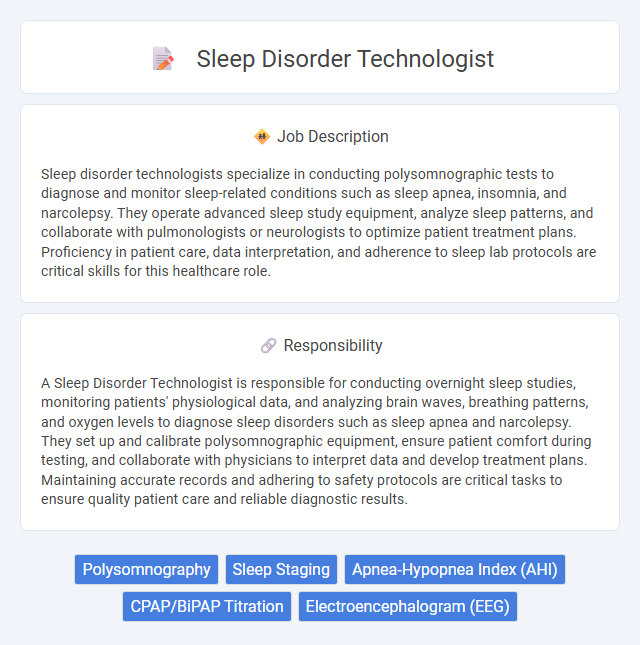
Sleep disorder technologists specialize in conducting polysomnographic tests to diagnose and monitor sleep-related conditions such as sleep apnea, insomnia, and narcolepsy. They operate advanced sleep study equipment, analyze sleep patterns, and collaborate with pulmonologists or neurologists to optimize patient treatment plans. Proficiency in patient care, data interpretation, and adherence to sleep lab protocols are critical skills for this healthcare role.
Sleep disorder technologists likely thrive in environments requiring attention to detail and empathy, as they work closely with patients experiencing sleep issues such as apnea, insomnia, or restless leg syndrome. Individuals with strong analytical skills and an interest in medical technology may find this role suitable, given its technical nature involving monitoring and interpreting sleep studies. Those struggling with irregular sleep patterns themselves or who prefer less patient interaction might find this job less compatible with their personal inclinations.
Qualification
Sleep disorder technologists require specialized training in polysomnography and certification from recognized bodies such as the Board of Registered Polysomnographic Technologists (BRPT). A minimum of an associate degree in respiratory therapy, cardiopulmonary technology, or a related health science field is often preferred. Proficiency in operating sleep study equipment and interpreting sleep data is essential for accurate diagnostics and patient care.
Responsibility
A Sleep Disorder Technologist is responsible for conducting overnight sleep studies, monitoring patients' physiological data, and analyzing brain waves, breathing patterns, and oxygen levels to diagnose sleep disorders such as sleep apnea and narcolepsy. They set up and calibrate polysomnographic equipment, ensure patient comfort during testing, and collaborate with physicians to interpret data and develop treatment plans. Maintaining accurate records and adhering to safety protocols are critical tasks to ensure quality patient care and reliable diagnostic results.
Benefit
Sleep disorder technologists likely provide critical support in diagnosing and treating sleep-related conditions, improving patients' overall health and quality of life. The job may offer opportunities for skill advancement and specialization in a growing healthcare field with increasing demand. Benefits might include competitive salaries, healthcare coverage, and the satisfaction of contributing to better sleep and well-being for diverse patient populations.
Challenge
The role of a sleep disorder technologist likely involves managing complex diagnostic equipment and interpreting sleep study data, which can present significant technical challenges. Candidates may encounter difficulties adapting to rapidly evolving sleep technology and maintaining accuracy in recording physiological data. Stress from working night shifts and ensuring patient comfort during sleep studies could also contribute to the job's demanding nature.
Career Advancement
Sleep disorder technologists specializing in polysomnography have strong career advancement opportunities by gaining certifications such as Registered Polysomnographic Technologist (RPSGT) to enhance expertise and credibility. Progression can lead to supervisory roles, sleep lab management, or specialized clinical positions in diagnosing and treating complex sleep disorders. Continuing education and mastering emerging technologies in sleep medicine contribute to higher salaries and leadership positions within healthcare facilities.
Key Terms
Polysomnography
Sleep disorder technologists specialize in polysomnography, conducting overnight sleep studies to diagnose and monitor conditions such as sleep apnea, insomnia, and narcolepsy. They operate advanced polysomnographic equipment to record brain waves, oxygen levels, heart rate, and respiratory effort during sleep. Proficient knowledge of sleep medicine and adherence to protocols established by the American Academy of Sleep Medicine enhance accuracy and patient care in sleep disorder diagnosis.
Sleep Staging
A Sleep Disorder Technologist specializing in sleep staging accurately monitors and records brain activity using polysomnography to identify various sleep stages such as REM and non-REM. Expertise in interpreting EEG patterns and applying the American Academy of Sleep Medicine (AASM) scoring criteria ensures precise diagnosis of sleep disorders like sleep apnea and narcolepsy. Proficiency with advanced sleep study equipment and data analysis software enhances the technologist's ability to provide critical insights for effective patient treatment.
Apnea-Hypopnea Index (AHI)
Sleep disorder technologists specialize in diagnosing and managing sleep disorders, with a critical focus on monitoring the Apnea-Hypopnea Index (AHI) to assess the severity of sleep apnea. Precise measurement of AHI, which quantifies the number of apneas and hypopneas per hour of sleep, is essential for creating tailored treatment plans and improving patient outcomes. Expertise in polysomnography and respiratory event detection enables these technologists to provide accurate data for effective therapeutic interventions.
CPAP/BiPAP Titration
Sleep disorder technologists specialize in conducting CPAP/BiPAP titration studies to optimize positive airway pressure settings for patients with obstructive sleep apnea. They monitor respiratory parameters, ensure patient compliance, and adjust machine pressures to improve sleep quality and reduce apnea events. Expertise in polysomnography equipment and respiratory therapy protocols is essential for accurate titration and effective treatment outcomes.
Electroencephalogram (EEG)
Sleep disorder technologists specializing in Electroencephalogram (EEG) play a crucial role in diagnosing and monitoring sleep-related neurological conditions by recording and analyzing brain wave activity during sleep studies. They operate EEG equipment to capture high-resolution data on brain electrical activity, which helps identify abnormalities such as sleep apnea, narcolepsy, and REM sleep behavior disorder. Expertise in EEG electrode placement, signal processing, and data interpretation is essential for providing accurate assessments that guide effective patient treatment plans.
 kuljobs.com
kuljobs.com